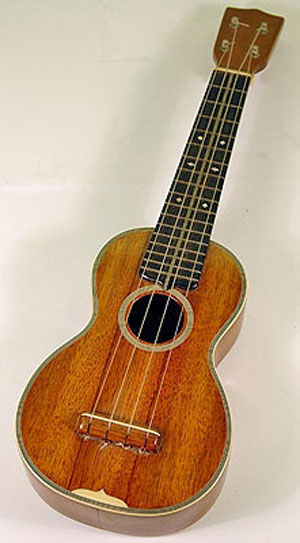
The ukulele, also called a uke, is a member of the lute family of instruments of Portuguese origin and popularized in Hawaii. It generally employs four nylon strings.
The music of Hawaii includes an array of traditional and popular styles, ranging from native Hawaiian folk music to modern rock and hip hop. Styles like slack-key guitar are well known worldwide, while Hawaiian-tinged music is a frequent part of Hollywood soundtracks. Hawaii also made a contribution to country music with the introduction of the steel guitar. In addition, the music which began to be played by Puerto Ricans in Hawaii in the early 1900s is called cachi cachi music, on the islands of Hawaii.
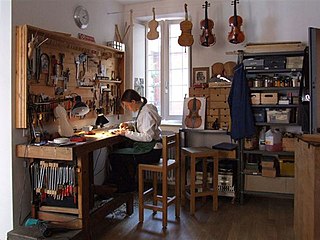
A luthier is a craftsperson who builds or repairs string instruments that have a neck and a sound box. The word "luthier" is originally French and comes from the French word for lute. The term was originally used for makers of lutes, but it came to be used in French for makers of most bowed and plucked stringed instruments such as members of the violin family and guitars. Luthiers, however, do not make harps or pianos; these require different skills and construction methods because their strings are secured to a frame.

Slack-key guitar is a fingerstyle genre of guitar music that originated in Hawaii. Nearly all slack key requires retuning the guitar strings from standard (EADGBE), and this usually means lowering or "slacking" several strings. The result will most often be an open major chord, although it can also be a major-seventh chord, a sixth, or (rarely) a minor. Different tunings were once guarded fiercely and passed down as family secrets.
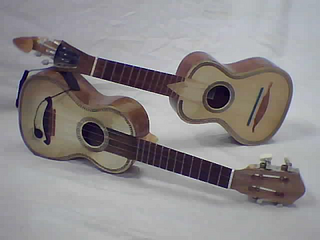
The cavaquinho is a small Portuguese string instrument in the European guitar family, with four wires or gut strings.

Jake Shimabukuro is a Hawaiian ukulele virtuoso and composer known for his fast and complex finger work. His music combines elements of jazz, blues, funk, rock, bluegrass, classical, folk, and flamenco. Shimabukuro has written numerous original compositions, including the entire soundtracks to two Japanese films, Hula Girls (2007) and Sideways (2009), the Japanese remake of the same name.
The Grammy Award for Best Hawaiian Music Album was an honor presented to recording artists from 2005 to 2011 for quality Hawaiian music albums. The Grammy Awards, an annual ceremony that was established in 1958 and originally called the Gramophone Awards, are presented by the National Academy of Recording Arts and Sciences of the United States to "honor artistic achievement, technical proficiency, and overall excellence in the recording industry, without regard to album sales or chart position".
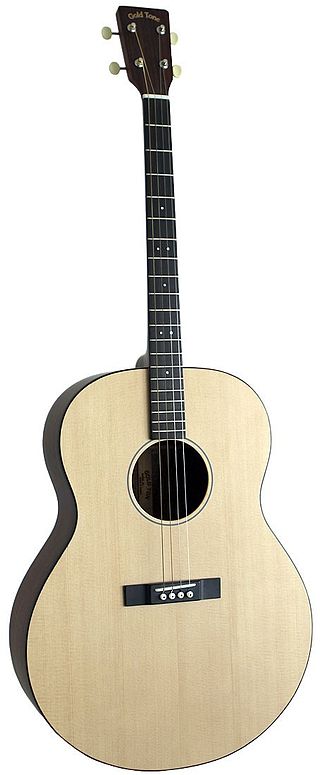
The tenor guitar or four-string guitar is a slightly smaller, four-string relative of the steel-string acoustic guitar or electric guitar. The instrument was initially developed in its acoustic form by Gibson and C.F. Martin so that players of the four-string tenor banjo could double on guitar.

Gently Weeps is the fifth U.S. solo album by ukulele artist Jake Shimabukuro, released in September 2006 on the Hitchhike Records label. In Japan the album was released on June 19, 2006 by Sony Music Distribution, with 17 tracks, many of which differed from the U.S. release, and additional bonus tracks on a CD-ROM.
Peter Moon was an American ukulele and slack-key guitar player.

Kaimuki High School is a WASC-accredited four-year public high school located in Honolulu, Hawaiʻi, United States. Kaimuki High School falls under the jurisdiction of the Hawaii Department of Education. It is bordered by the Manoa-Palolo Drainage Canal, Kapiolani Boulevard, Kaimuki Avenue, Crane Park and Date Street. It is, as its alma mater states, in view of Diamond Head. The campus boasts the sculpture Pueo (owl) by Charles W. Watson.
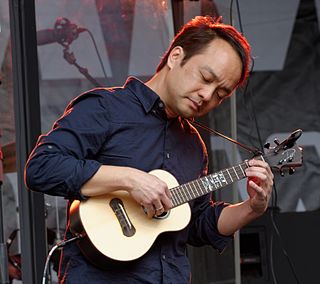
Daniel Ho is an American musician, composer and producer specializing in innovative approaches to Slack-key guitar, ukulele, and Hawaiian music. He has recorded 18 solo albums, some of which have won or were nominated for Grammy Awards, and has produced over 50 albums.
Stephen M. Sano is Professor of Music, the Harold C. Schmidt Director of Choral Studies, and the Rachford & Carlota A. Harris University Fellow in Undergraduate Education at Stanford University. Using the name Steve Sano, he is also an accomplished kī hō'alu, or slack-key guitar, player.
Jesse Kaleihia Andre Kalima (1920–1980) was an ukulele player.

Lichty Guitars is an American company based in Tryon, North Carolina, that has been making custom acoustic guitars and ukuleles since 2009. It was founded by musician Jay Lichty.

The Guitar and Lute Workshop (GLW) was a manufacturer of custom guitars, ukuleles, and period stringed instruments based in Honolulu, Hawaii between 1970 and 1976. The workshop was known primarily for the talented luthiers employed in either construction of guitars, or the musicians that taught at the workshop or that used guitars made at the workshop. Additionally, an independent piano restoration and tuning business operated above the workshop floor and studios for at least two years. The GLW was notable as a nexus of activity supporting native Hawaiian musical cultural discovery during the Second Hawaiian Renaissance of the 1970s, with key Hawaiian musicians such as Keola Beamer and Kapono Beamer gaining starts in their careers at the GLW, as well as musical instrument restoration for instruments of Hawaiian royalty, now curated by ʻIolani Palace. Additionally, the GLW's focus on traditional period stringed instruments was, in part, responsible for the resurgent interest in the viol and traditional luthierie methods within the western United States in the early 1970s.

Blackbird Guitars is a musical instrument company that manufactures acoustic guitars and ukuleles from composite materials, including carbon fiber and ekoa, a flax linen reinforcement fabric in a bio-epoxy matrix. The company has made contributions to both the field of luthiery and the field of composite design, notably with the composite all-hollow unibody instrument design used on all Blackbird models, as well as the development and use of Ekoa in the construction of fretted instruments.

Taimane Tauiliili Bobby Gardner, who often performs under the mononym Taimane, is an American ukulele virtuoso and composer. In 2019, she won a Nā Hōkū Hanohano award, for Favorite Entertainer of the Year. In 2019, Taimane Gardner's song, Water, from her album, Elemental was nominated for Instrumental Composition of the Year by Nā Hoku Hanohano Awards.

Travels is the eleventh solo album by Japanese-American ukulele virtuoso, Jake Shimabukuro. It was released on October 9, 2015, by Hitchhike Records. The album peaked at No. 2 on the Billboard World Albums chart and No. 11 on its Heatseekers Albums chart.
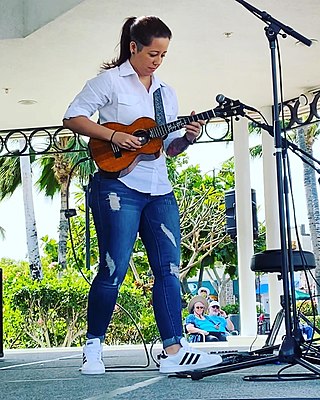
Brittni Paiva is an American musician, songwriter, and music producer. She is best known for playing the ukulele and has won several Na Hoku Hanohano Awards, including Most Promising Artist of the Year for her album, Brittni x 3, which she won at fifteen years old in 2005. She has performed with Carlos Santana and her 2012 album release, Tell U What, features artists Michael McDonald, and Chuck Findley, among others.
















